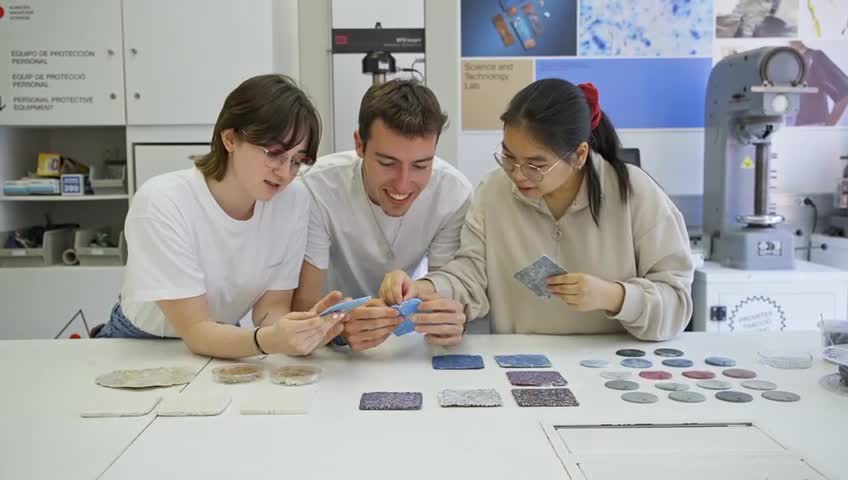Para qué sirve
FIX collects and revalues washing machine textile waste, which contains microplastics, in a new material to avoid being released into the marine environment, exploring not only how we can avoid microplastic emissions but also how they can add value to us.
Qué te inspiró
FIX was born from the concern of how to reduce the environmental impact that microplastics generate on the environment. Microplastics are particles smaller than 5 mm that come off during the washing process, which have their origin in the clothes and are one of the main causes of the pollution of the oceans and seas. Thanks to the team's commitment to the environment and the collaboration with Girbau LAB, a collaborative innovation space that belongs to the multinational company Girbau, a pioneer in manufacturing technology for industrial laundry, the challenge of microplastics is undertaken.
Cómo funciona
The new composite material is made of the encapsulation of washing machine waste (3% by weight), which contains microplastics, mixing it with recyclable polypropylene plastic (97% by weight). In this way, microscopic particles such as microplastics are agglomerated with the polypropylene matrix, preventing their release into the environment, ensuring that they are incorporated into a circular economy system and improving the flexure mechanical properties of the original PP. In addition, it can be obtained in various formats such as pellets or 3D printing filament, adapting to today’s new industrial processes. Additionally, a spool and packaging have been designed for the 3D printing filament made with the new material developed. They consist of a single monomaterial piece, based on the union of both elements, minimizing the number of materials as much as possible and using recycled corrugated cardboard, which is ecological and economical.
Proceso de diseño
To face the challenge of microplastics, the first thing we did was an investigation of this type of waste. Using a washing machine and filter mesh provided by Girbau LAB, we were able to capture the waste, which contains microplastics, in order to analyze its characteristics. Finally, we realized that it was a very difficult waste to capture, control and manage because it contains fibers and small particles and a wide variety of synthetic and natural materials. For this reason, we decided that the best way to prevent these particles from being released into the environment was to encapsulate them using a recyclable plastic matrix. To arrive at the final material and the 3D printing filament, a large number of tests and experimentation were carried out through different transformation processes such as thermal pressing, plastic injection, extrusion and 3D printing. For the spool and packaging, we observed that conventional products of this type are not environmentally friendly objects, using materials excessively. For this reason, we made a series of recycled cardboard prototypes exploring how we could join the spool and the packaging in a single piece in order to reduce raw materials and replace conventional materials with more ecological ones.
Qué lo hace diferente
Currently, there are several projects and companies that are developing products to capture textile waste from washing machines in order to avoid the release of microplastics into the environment. However, none of these initiatives explain what will happen once the residue has been captured. FIX explores not only how microplastic emissions can be avoided, but also investigates how we can revalue them. In addition, this material aims to raise awareness about the environmental impact of microplastics and has an aesthetic value brought by the encapsulation of microplastic waste. It can be obtained in various formats such as pellets or 3D printing filament, allowing it to be used in a myriad of applications and adapting to today's new industrial processes. On the other hand, the spool and packaging are designed to question conventional products in an innovative way, resulting in a mono-material, one-piece, and ecological product.
Planes para el futuro
Although we are very happy with the results achieved, we believe that it would be very interesting to continue investigating how we can increase the amount of waste introduced into the recyclable plastic matrix and optimize the material for industrialization. In addition, we believe that it would be very powerful to open a new line of work and develop logistics that allow the new material to be processed and managed optimally and taking into account all the stages of the life cycle.
Premios
FIX is honored to have won an iF Design Student Award.



Compartir esta página en